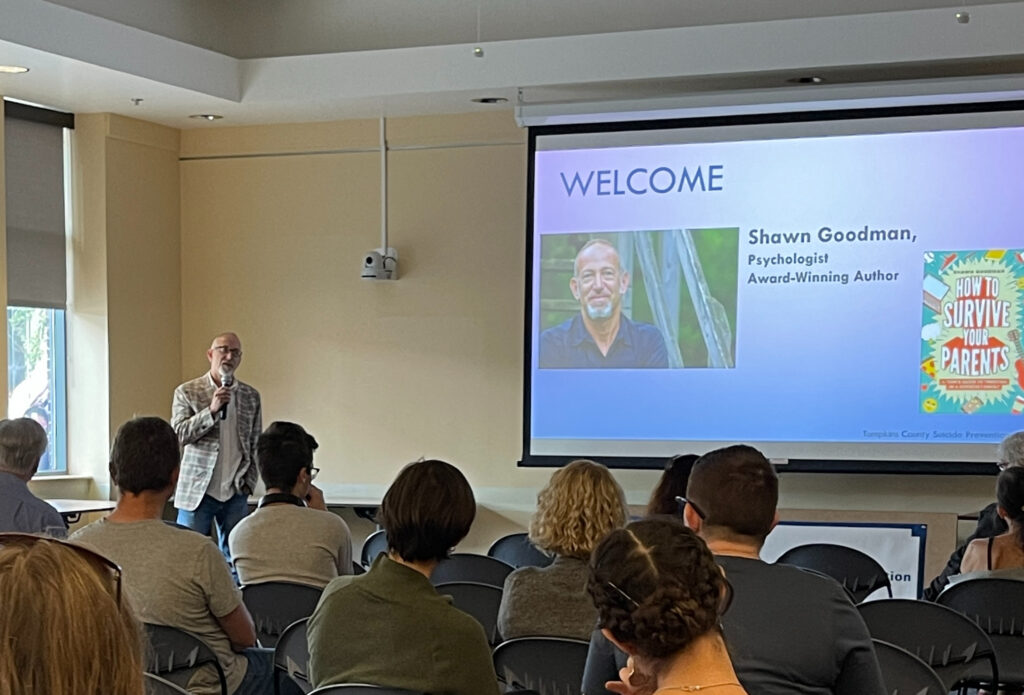
Shawn Goodman presents his new book, How to Survive Your Parents. Josiah Brooks
On October 5, about thirty community members gathered in the Tompkins County Public Library for a town hall about youth mental health and well-being. The event was hosted by the Tompkins County Suicide Prevention Coalition, a coalition encompassing both healthcare and mental health organizations and concerned community members.
Tiffany Bloss, Executive Director of the Suicide Prevention and Crisis Service of Tompkins County and facilitator of the town hall, emphasized that talking about mental health and especially about suicide is “how we’re going to make a difference […] The more people that we can get engaged, the bigger difference we’re going to make.”
Suicide can be a difficult topic, however, which is why attendees were given the opportunity to visit a self-care space with counselors, activities, and resources at any time during the event. Snacks, brochures, fidget toys, and stickers were also available for attendees.
County Legislator Randy Brown (District 8) gave the opening remarks, asserting that “youth mental health is the issue of our time.” He encouraged attendees to contact their county legislators about the kind of support for youth mental health they’d like to see from the Legislature moving forward; “There’s more that we can do as a County.”
Melanie Little, a community educator and peer specialist with the Mental Health Association in Tompkins County, spoke next and gave a short presentation on the basics of mental health and well-being. She emphasized that “mental health is something for us all to think about.” Her presentation covered statistics about the prevalence of various mental health problems among young people, common risk factors for mental illness, and an introduction to mental health stigma.
Next, author and IHS school psychologist Shawn Goodman addressed difficult family dynamics and the effects they can have on young people. His most recent book, How to Survive Your Parents, is based on years of professional experience and seeks to fill a gap Goodman sees in mental health literature by giving concrete, accessible, and realistic advice for improving family dynamics as a young person. Goodman said that if he could only give one piece of advice to young people with difficult family lives, it would be to “have the freedom to manage the situation and not the relationship” and to avoid taking responsibility for troubled parents.
Tiffany Bloss spoke about the importance of talking openly about suicide with your children and creating space for them to comfortably bringit up. She highlighted the 988 hotline, which people can call for advice when they or someone else in their life is in crisis. She also drew attention to the vulnerability of young people as they try to navigate an overwhelming world, especially when it comes to social media. She encouraged parents to talk to their children about what restrictions on social media make sense and how to stay safe and healthy without abandoning social media entirely.
Contact Center Manager for the Human Services Coalition Nicole Roulstin spoke next, giving a short presentation on the variety of services offered by the 211 helpline, which is open to any questions Tompkins County residents might have that don’t fit the 988 crisis line. The community service specialists are prepared to connect callers to the resources they need—whether that’s information on what to do about a bat in their home, help finding a job, or the phone number of a certain agency.
After a short break, Pat Breux, formerly with Suicide Prevention of Central New York, spoke about youth suicide prevention initiatives across the state. She emphasized the role of school communities in suicide prevention and the importance of “warm hand-offs” between agencies so that people don’t get lost in the process.
Breux’s presentation led to a passionate discussion among attendees about what schools in the area are doing for suicide prevention and where they could improve. Kari Burke, the coordinator of Health Services and Wellness for ICSD, spoke up about the suicide prevention training she provides to staff and the district protocols in place for suicide “prevention, intervention, and postvention.”
For the last part of the event, a young person with lived experience of mental illness and hospitalization openly shared her story for the first time. In the words of Bloss, “It doesn’t hit a lot of times until you hear it from the voices of our youth.”
In her closing statement, Bloss encouraged attendees, especially young people and those with lived experience with mental health struggles, to join the Suicide Prevention Coalition to share their perspectives and help out.
